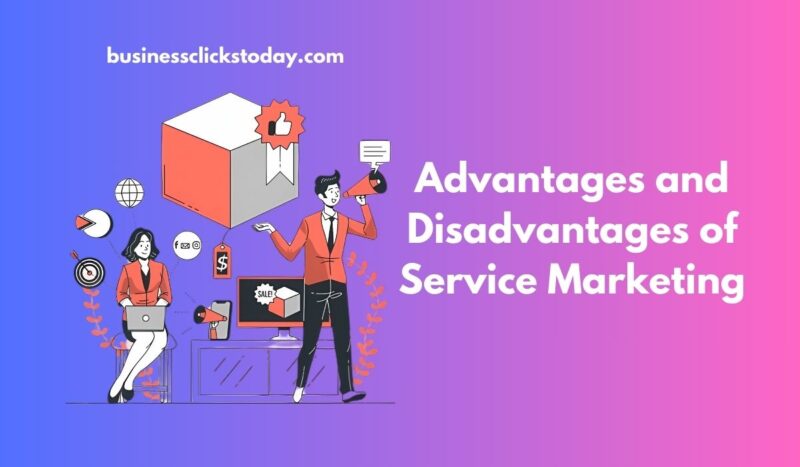Advantages and Disadvantages of Service Marketing: Service marketing refers to the strategies and techniques used to promote and sell services rather than physical products. Unlike tangible goods, services are intangible and often involve customer interaction, making service marketing a distinct discipline. By effectively marketing services, businesses can improve cash flow, enhance their reputation, and stand out in a crowded market. However, service marketing also comes with its own set of challenges. This article will explore the advantages and disadvantages of service marketing to provide a comprehensive understanding of this field.
Advantages of Service Marketing
1. Enhancing Business Image
In any market, including India, trust plays a crucial role in business success. Effective service marketing can significantly boost a company’s image by presenting it as reliable and credible. When businesses excel in marketing their services, they are perceived as more established and trustworthy. This positive perception helps attract more customers and fosters brand loyalty.
2. Improved Cash Flow
Proper service marketing can lead to increased revenue. By promoting services effectively, businesses can attract more clients and generate higher profits. Even services that may not seem particularly lucrative can benefit from strategic marketing, making them more appealing to potential customers. This influx of cash can be vital for business growth and exploring new opportunities.
3. Differentiation in a Competitive Market
The market, especially in densely populated regions like India, is highly competitive. Service marketing provides a means to stand out from the crowd. By highlighting unique aspects of their services and effectively communicating their value, businesses can differentiate themselves from competitors. This differentiation helps in building a strong brand presence and making a memorable impression on customers.
4. Customer Loyalty
Retaining existing customers is often more cost-effective than acquiring new ones. Effective service marketing not only attracts new clients but also helps in retaining them. By delivering consistent and high-quality service, businesses can foster customer loyalty. Satisfied customers are likely to recommend the service to others, further contributing to business growth.
5. Increased Team Productivity
Service marketing can also positively impact team productivity. When a business has a clear marketing strategy, it aligns the team’s efforts towards common goals. Understanding the value of their work and how it contributes to the overall marketing strategy can motivate employees. A well-coordinated team that is aware of its role in service delivery will perform more efficiently and provide better customer service.
Disadvantages of Service Marketing
1. Intangibility
One of the main challenges in service marketing is the intangibility of services. Unlike physical products that can be seen and touched, services cannot be experienced before purchase. This intangibility makes it difficult for potential customers to evaluate the service’s quality in advance. In India, where consumers often prefer a hands-on experience before committing to a purchase, this can be a significant barrier to selling services.
2. Variable Quality
The quality of services can vary greatly depending on the provider. For instance, a haircut or a consulting session can differ in quality based on the individual performing the service. This variability can create uncertainty for customers, who may question whether they are getting value for their money. Inconsistent service quality can lead to dissatisfaction and negatively impact the business’s reputation.
3. Perishability
Services are perishable, meaning they cannot be stored or saved for later. For example, an empty seat on a flight or a missed appointment cannot be sold once the time has passed. This characteristic of services presents a challenge in managing supply and demand. In a fluctuating market like India, businesses must continuously manage and forecast demand to minimize losses from unsold services.
4. Dependence on Personnel
The success of service marketing heavily relies on the personnel delivering the service. The skill, attitude, and behavior of employees can significantly influence customer satisfaction. Inconsistent service delivery due to varying levels of staff performance can affect the overall quality of the service. Therefore, investing in training and maintaining a competent team is crucial for effective service marketing.
5. Complexity in Communication
Communicating the value of a service can be more complex than selling a tangible product. Service marketing requires crafting a compelling narrative that conveys the benefits and experiences associated with the service. In India, where consumers often seek reassurance and detailed information before making a decision, businesses must invest in building trust and effectively explaining the service’s value proposition.
Conclusion
Service marketing presents both opportunities and challenges. On the positive side, it can enhance business image, improve cash flow, differentiate a company in a competitive market, foster customer loyalty, and boost team productivity. However, it also involves dealing with challenges such as the intangibility of services, variable quality, perishability, reliance on personnel, and the complexity of communication.
Understanding these aspects can help businesses develop effective service marketing strategies that address potential issues while leveraging the advantages. By carefully managing both the positive and negative aspects of service marketing, businesses can position themselves for success in a competitive marketplace.
















